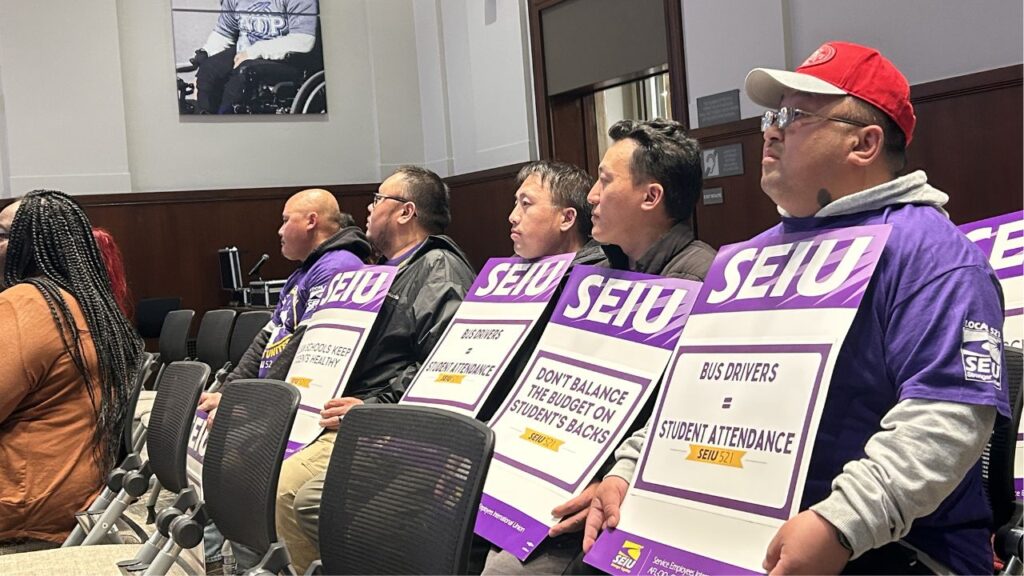If the next Republican president implements Project 2025, California will face an ultimatum: report sensitive abortion data to the CDC or jeopardize Medicaid funding. (CalMatters/Gabriel Hongsdusit)

- The conservative plan targets states like California that protect abortion rights and patient privacy.
- California could lose billions in Medicaid funding for reproductive health if it refuses to comply.
- Experts warn increased surveillance could deter vulnerable groups from seeking necessary healthcare.
Share
|
Getting your Trinity Audio player ready...
|
Project 2025, the 900-page conservative playbook for the next Republican president, issues an ultimatum for California: track and report abortion data to the federal government or risk losing billions in Medicaid funding for reproductive health.

Monique O. Madan
CalMatters
California is one of only three states that do not report abortion data to the Centers for Disease Control and Prevention.
Project 2025’s proposed federal mandate directly conflicts with the state’s strong protections for patient privacy and could dismantle the legal and ethical foundations that have made California a refuge for those seeking reproductive care.
The blueprint, crafted by Donald Trump allies and leaders in his first administration, clearly targets states with abortion protections like California, seeking the kind of data that could be used to target abortion-seekers or even criminally punish out-of-staters who come to the state for reproductive health services.
“Because liberal states have now become sanctuaries for abortion tourism, [the Department of Health and Human Services] should use every available tool, including the cutting of funds, to ensure that every state reports exactly how many abortions take place within its borders, at what gestational age of the child, for what reason, the mother’s state of residence, and by what method,” reads the chapter on abortion reporting.
Roger Severino, who served as the Department of Health and Human Services’ director of the Office for Civil Rights under Trump, authored Project 2025’s abortion surveillance plan. He is now the vice president of domestic policy at the Heritage Foundation, the conservative think tank behind Project 2025. He declined an interview with CalMatters.

As Project 2025 and reproductive health have become major campaign themes, Trump continues to distance himself from the right-wing plan. He’s repeatedly called some of the project’s proposals “abysmal” and has said “I have no idea who is behind it.” Paul Dans, the Project 2025 director and a former top adviser in Trump’s administration, resigned from the Heritage Foundation in July after Trump began to disengage from the plan.
In yesterday’s presidential debate, Vice President Kamala Harris explicitly warned about Project 2025’s plans to monitor “your pregnancies, your miscarriages.”
Related Story: California Dems Strike Back Against Local Conservative Rebellions on LGBTQ ...
On the stage, Trump denied supporting a national abortion ban, in part because the fall of Roe led to his desire for each state to implement its own policy. “This is an issue that’s torn our country apart for 52 years,” Trump said on the debate stage. “Every legal scholar, every Democrat, every Republican, liberal, conservative, they all wanted this issue to be brought back to the states where the people could vote. And that’s what happened.”
Harris’ home state has a long history of protecting reproductive rights. The state legalized abortion in 1967, six years before the landmark Roe v. Wade decision, and has since enacted numerous laws to ensure access to abortion care.
The California Constitution includes an explicit right to privacy, which has been interpreted by state courts to guarantee the right to choose an abortion.
California, along with Maryland and New Hampshire, does not require abortion providers to report patient data to the federal government, as Severino points out. The California Department of Public Health said just days after Roe v. Wade was overturned that it does not report abortion data to the federal government because it is not required to do so. The states that do collect data generally use it for public health analysis that can help improve abortion access by identifying gaps and needs
Under Project 2025, all 50 states would be required to submit to the federal government data such as the reason for the abortion, fetus’ gestational age, the birthing parent’s state of residence, whether the procedure was surgical or pill-induced, and more.
Cat Duffy, a policy analyst at the National Health Law Program, said the intention of collecting this data “is not one of scientific exploration.”
“It’s to create a culture of fear, which will spread, not just to abortion seekers, but pregnant people as well, who will be afraid of going to the doctor and what they tell the doctor,” she said.
Medi-Cal and Access to Critical Care
Medicaid – known as Medi-Cal in California – is the single largest payer of maternity care in the country. So, if California fought the proposed abortion reporting requirements, billions of dollars in Medicaid funding that provides critical reproductive healthcare services would be at risk.
The state didn’t immediately release figures showing how many Californians rely on Medi-Cal for family planning or how much money would be at stake. But Medi-Cal’s family planning funds pays for about 39 percent of all births in the state. In total, Medi-Cal covers about 14.2 million Californians, according to a June 2024 report. Medi-Cal brought in $85 billion in federal funds in fiscal year 2021–2022.
Medicaid operates as a state-federal partnership, with the federal government paying a percentage of the costs. And in exchange, states have to comply with minimum requirements set forth by the federal government.
Some examples of minimum requirements include providing mandatory benefits such as transportation to medical appointments; maintaining programs for preventing and detecting Medicaid fraud; and reporting immunization figures and annual pediatrician visits. Project 2025 seeks to establish abortion surveillance as another minimum requirement.
Duffy estimates Medi-Cal spends multiple billions annually on reproductive health, considering the costs of comprehensive services like contraceptives, counseling, reproductive health education, prenatal care, labor and delivery, postpartum care, STI and cancer testing, and infertility treatments.
“If a state like California decided to not comply with those abortion reporting requirements, it could lose billions of dollars and would likely hamstring the ability of the state to provide sexual and reproductive healthcare services,” Duffy said. “Because while I think that there are states that would try to compensate with state funds, it’s just a lot of money to make up and that it could potentially be really devastating.”
Duffy noted that the proposal could increase surveillance of individuals seeking abortions, particularly targeting vulnerable populations. The fear of being monitored or reported could deter these groups from seeking necessary healthcare, increasing health risks, she said, adding that it can also heighten the risk of legal repercussions for both patients and providers, further marginalizing those already facing systemic inequalities.
“Those disproportionately impacted by the provisions in Project 2025 are the same folks that are disproportionately impacted by abortion bans: It’s communities of color, it’s young people, it is LGBTQ+ individuals.”
Related Story: Ballot Measures in 41 States Give Voters a Say on Abortion and Other Tough ...
Fear of Being Monitored—in the Clinic and Beyond
Josie Urbina, an OB-GYN at San Francisco General Hospital and a research fellow at the University of California, San Francisco, said some individuals are more prone to pregnancy complications due to social determinants like low socioeconomic status, living in urban areas, or exposure to toxins. These factors, along with pre-existing conditions such as diabetes, heart disease, high blood pressure, and chronic stress, contribute to poor outcomes.
Research from the University of California also found that while receiving an abortion does not negatively affect women’s health, being denied one leads to worsened financial, health, and family outcomes.
“And what we’ve seen sometimes for some of our patients who have these comorbidities is that they’re more susceptible to stillbirth, hemorrhage, preeclampsia and eclampsia,” Urbina said. “And that can lead to complications that are life threatening, where a patient loses their life because of the severity of the medical condition that worsens with the progression of a pregnancy.”
In recent years, abortion has increasingly become criminalized in the United States, with a wave of restrictive laws and policies sweeping across state lines. Following the overturning of Roe v. Wade, many states enacted strict abortion bans, with some imposing severe penalties, including lengthy prison sentences, for healthcare providers who perform abortions.
These bans also create a chilling effect on those seeking care, as well as on the medical professionals who may fear prosecution. This trend has resulted in a patchwork of abortion access across the country, as the legality of the procedure and the risk of criminalization vary dramatically depending on geographic location.
Hayley Tsukayama, associate director of legislative activism at the Electronic Frontier Foundation, said that the language used in Project 2025’s abortion surveillance proposal is framed to “overhaul” the medical system in a way where there will be more integrated data sharing, including intimate information ending up in the hands of data brokers where there’s room for possible data misuse.
Related Story: Former Project 2025 Leader Accuses Trump Campaign Advisers of ‘Malpractice’
“There isn’t a lot of talk about consent or patient knowledge in this document. So it certainly opens up doors to the possibility of more data sharing and possibly more scrutiny on the way that data flows,” she said. “The data that will be collected can get sent to data brokers who can re-identify information pretty quickly and paint a picture of your life.”
This has already happened with period-tracking apps that share data with Facebook and Google without users’ consent. If abortion data were similarly exposed, it could lead to serious privacy violations and unintended consequences, including harassment, discrimination, or even legal action against patients, Tsukayama said.
“We’re already in a supercharged, data-driven ecosystem,” she said. “And we’re going to see that increase.”
About the Author
Monique investigates tech at the intersection of criminal justice, social justice, government accountability and immigration. Before joining CalMatters and The Markup, she was a national investigative reporter at USA. In 2021, she led a team that revealed how a Florida collapsed condo was born of botched construction and evidence of money laundering.
About CalMatters
CalMatters is a nonprofit, nonpartisan newsroom committed to explaining California policy and politics.


















